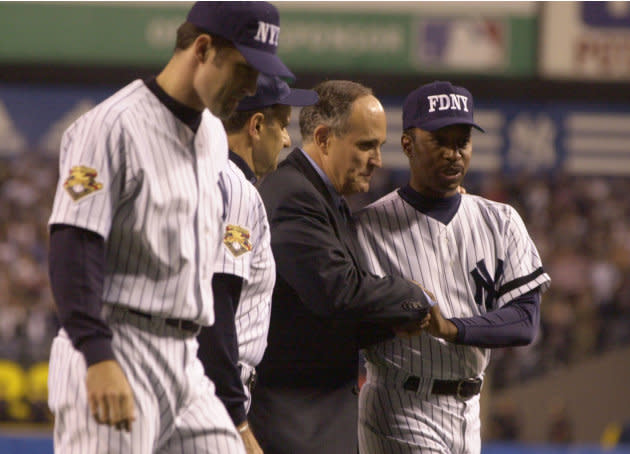 Yahoo 9/11 10th Anniversary
Yahoo 9/11 10th AnniversarySports mattered after 9/11 – not as a game, but as a gathering
They didn't shut down movie theaters across the country in the days after the September 11 attacks. They didn't cancel musicals, didn't close bars or nightclubs, didn't say you couldn't go to the park or the beach.
They shut down sports.
It was voluntary, a wave of cancellations from professional leagues to college programs after some hours and even days of debate. The President wanted life to go on, the economy to still churn, the terrorists to see that they hadn't altered the American lifestyle.
Sports shut down anyway. Even far from the smoke of the East Coast, it seemed trivial, tens of thousands gathered for a game.
And it was trivial.
There were safety concerns, although that wasn't the chief reason. The terrorists had figured out how to hijack airplanes and fly them into buildings to kill nearly 3,000 innocent people, so filing into a huge stadium felt, if not dangerous, then at least uncertain.
That wasn't why they stopped sports, though.
They did so because, perhaps, there was more to it than other entertainment options. They did so, perhaps, for the same reason it actually meant something, for the shortest of times, when sports returned.
The large crowd in a huge stadium is arguably the most collective temporary experience we have in America. As one of many, you can lose yourself in the bleachers, in the atmosphere, in the shared rooting interests and enjoyment.
You can both view and participate in the celebratory madness at the same time.
At the movies talking is discouraged. At many sporting events, cheerleaders (or jumbotrons) are employed to encourage screaming.
This is where sports came to matter.
This is why they play the Star Spangled Banner, why no one dare build a facility without a spot for a flag, why it's become the place to honor soldiers and hold moments of silence for even local civilian deaths.
Teams and athletes have marketed themselves as "nations." Red Sox Nation. Gator Nation. Junior Nation. This is where you lose yourself in a subset of the culture.
And so this is what sports did. And, it's worth reminding, it's all it did.
Sports don't matter more since September 11. September 11 didn't change sports and sports didn't change September 11.
Sports mattered the same: not as a game, but as a gathering.
The games were a diversion, but there were already diversions. Those movies kept flickering. The waves kept crashing. Cookouts and weddings and reunions kept happening.
Sports simply offered the biggest possible vision of patriotism, offered that collective celebration of America, the chance to be part of a huge show that we were still here, that we still mattered, that we could still roar.
There were still lives lost and families mourning and promise of challenges and wars ahead. No game could ever matter against all of that. They still don't.
For a stretch, though, the mood of the country after September 11 was different. People had a new outlook, a new frame of mind. Divisions were erased. Unity filled the gaps.
Politicians of all parties gathered on the steps of the Capital and expressed genuine togetherness. Celebrities rallied to telethons and looked as if they did so because they cared, not to promote their careers.
We were one country, facing enormous challenges that haven't been answered to this day. It was somber and scary.
And so here, at last came sports. Baseball games. Football games. NASCAR races.
The New York Giants were cheered taking the field in Kansas City. The New York Mets staged a remarkable comeback in the first live event in the city. The New York Yankees became a loveable outfit as they reached the World Series that fall, a nightly display of American spirit both pregame and during the dramatic seventh-inning stretch.
It was more than New York, though. It was everywhere.
The first live sporting event I attended following the attacks was a Michigan State-Notre Dame game in South Bend Ind., a world away from lower Manhattan and the Pentagon.
The South Bend Tribune had printed 80,000-plus newspapers with American flags on the back and all the fans held them up during the national anthem. In one corner of the old stadium they pulled an American flag all the way to the top and then brought it back to down slowly, to a haunting half-mast. There was a prayer.
This was not an elaborate production. No fireworks or pyrotechnics or professionally choreographed acts.
It was how it was supposed to be – simple, purposeful, meaningful.
And so even as it meant nothing in the large scheme, it meant something in the small. There was strength in numbers, pride in the moment.
It wouldn't last. Sports are no different now than before the attacks. Politics is no kinder. The country is as divided – and as unified – as ever.
It's trite and easy to say sports changed the country or helped it heal or made any lasting impact. If we had 50,000-seat movie theaters that encouraged a charged atmosphere, then that's where patriotism might have been most prevalent.
We don't. We have these sporting cathedrals. We have these adrenaline events. We have the moment we come together in bigger numbers than any other time.
That's why sports got shut down. That why, for the briefest of moments, that when they came back, they actually meant something.




